August 8, 2018 •
Special Session Called for South Dakota
Gov. Dennis Daugaard has called a special session for September 12. The session will address legislation allowing the state to enforce remote sellers to collect and remit sales tax. In addition to calling the session, Daugaard will be appointing three […]
 Gov. Dennis Daugaard has called a special session for September 12.
Gov. Dennis Daugaard has called a special session for September 12.
The session will address legislation allowing the state to enforce remote sellers to collect and remit sales tax.
In addition to calling the session, Daugaard will be appointing three people to fill vacancies in the Legislature to ensure the districts are fully represented during the special session.
August 7, 2018 •
Lawsuit Filed to Remove Issue from Missouri Ballot
A lawsuit has been filed to remove a referendum from the Missouri ballot. On August 2, Sec. of State Jay Ashcroft certified an ethics initiative for the November general election ballot. The proposal would limit legislative gifts from lobbyists, reduce […]
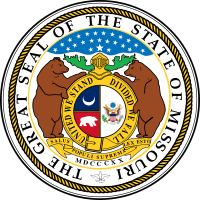 A lawsuit has been filed to remove a referendum from the Missouri ballot. On August 2, Sec. of State Jay Ashcroft certified an ethics initiative for the November general election ballot.
A lawsuit has been filed to remove a referendum from the Missouri ballot. On August 2, Sec. of State Jay Ashcroft certified an ethics initiative for the November general election ballot.
The proposal would limit legislative gifts from lobbyists, reduce campaign contribution limits for legislative candidates, create a two-year waiting period for public officials seeking to become lobbyists, and establish new procedures for redistricting.
The lawsuit claims the proposed referendum violates a provision of the Missouri Constitution limiting ballot measures to a single subject.
Combining multiple subjects in a single ballot measure can force voters to vote for a matter they do not support just to enact a proposal they do support.
August 7, 2018 •
FEC Disclosure Regulation Invalidated by Court for Being Too Narrow
On August 3, a federal court ruled a campaign finance disclosure regulation, followed for decades by the Federal Election Commission (FEC), failed to uphold disclosure requirements required by a federal statute. Chief Judge Beryl A. Howell of the United States District […]
 On August 3, a federal court ruled a campaign finance disclosure regulation, followed for decades by the Federal Election Commission (FEC), failed to uphold disclosure requirements required by a federal statute. Chief Judge Beryl A. Howell of the United States District Court for The District of Columbia issued an order, in CREW v. FEC, vacating 11 C.F.R. §109.10(e)(1)(vi), but stayed the vacatur for 45 days to give time for the FEC to issue interim regulations comporting with the statutory disclosure requirements of 52 U.S.C. §30104(c). The court also has allowed the FEC 30 days to change an earlier FEC dismissal to conform with the court’s ruling.
On August 3, a federal court ruled a campaign finance disclosure regulation, followed for decades by the Federal Election Commission (FEC), failed to uphold disclosure requirements required by a federal statute. Chief Judge Beryl A. Howell of the United States District Court for The District of Columbia issued an order, in CREW v. FEC, vacating 11 C.F.R. §109.10(e)(1)(vi), but stayed the vacatur for 45 days to give time for the FEC to issue interim regulations comporting with the statutory disclosure requirements of 52 U.S.C. §30104(c). The court also has allowed the FEC 30 days to change an earlier FEC dismissal to conform with the court’s ruling.
The case originated because of independent expenditures made in a 2012 Ohio senate race by the non-political social-welfare nonprofit Crossroads Grassroots Policy Strategies (Crossroads GPS), an affiliate of the American Crossroads Super PAC. Crossroads GPS did not report donors when reporting its independent expenditures, while it acknowledged receiving contributions over $200, arguing the donors did not donate funds directly tied to any specific reported expenditure, as the FEC interpreted 11 C.F.R. §109.10(e)(1)(vi) to require. Non-political committees making independent expenditures over $250 in a calendar year must comply with disclosure obligations closely analogous to those imposed on political committees.
The vacated regulation required the identification of each person who made a contribution in excess of $200 to the person filing a disclosure report, including for non-political 501(c)(4) non-profits entities making independent expenditures, if the contribution was made for the purpose of furthering the reported independent expenditure. The court found the regulation, as construed and applied by the FEC, did not require the disclosure of donors, absent the donor’s express agreement that the funds be used for the specific expenditures reported to the FEC, even though the donor may otherwise support and in fact contribute for the purpose of funding those expenditures. The court found the regulation impermissibly narrows the mandated disclosure in 52 U.S.C. §30104(c)(2)(C), which requires the identification of such donors contributing for the purpose of furthering the non-political committee’s own express advocacy for or against the election of a federal candidate, even when the donor has not expressly directed that the funds be used in the precise manner reported.
August 6, 2018 •
Maine Lobbyists Required to Have Harassment Training
Due to the passage of Legislative Document 1842, lobbyists will be required to complete an in-person harassment training. The training must be taken at the beginning of every regular session. Additionally, lobbyists must include the date the training was completed […]
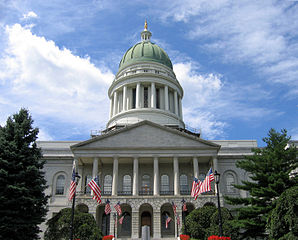 Due to the passage of Legislative Document 1842, lobbyists will be required to complete an in-person harassment training.
Due to the passage of Legislative Document 1842, lobbyists will be required to complete an in-person harassment training.
The training must be taken at the beginning of every regular session.
Additionally, lobbyists must include the date the training was completed on their lobbyist registration form.
The bill will become effective at the adjournment of the special session.
August 3, 2018 •
West Virginia Announces Registration Dates for Special Election
Secretary of State Warner announced the official registration dates for a special election to fill the seat vacated by former state Supreme Court Justice Menis Ketchum. The special election will occur concurrently with the general election on November 6. Ketchum […]
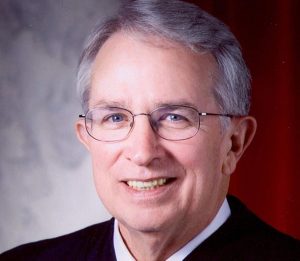 Secretary of State Warner announced the official registration dates for a special election to fill the seat vacated by former state Supreme Court Justice Menis Ketchum.
Secretary of State Warner announced the official registration dates for a special election to fill the seat vacated by former state Supreme Court Justice Menis Ketchum.
The special election will occur concurrently with the general election on November 6.
Ketchum recently agreed to plead guilty to a felony criminal count of wire fraud for using a vehicle and fuel card owned by the state for personal travel.
Ketchum resigned effective July 27 with two years left on his term.
Pictured: Former Supreme Court Justice Menis Ketchum
August 3, 2018 •
News You Can Use Digest – August, 3, 2018
National: As Midterm Elections Approach, a Growing Concern That the Nation Is Not Protected from Russian Interference Washington Post – Ellen Nakashima and Craig Timberg | Published: 8/1/2018 Two years after Russia interfered in the American presidential campaign, the nation […]

National:
As Midterm Elections Approach, a Growing Concern That the Nation Is Not Protected from Russian Interference
Washington Post – Ellen Nakashima and Craig Timberg | Published: 8/1/2018
Two years after Russia interfered in the American presidential campaign, the nation has done little to protect itself against a renewed effort to influence voters in the coming congressional midterm elections, according to lawmakers and independent analysts. They say voting systems are more secure against hackers, thanks to action at the federal and state levels, and the Russians have not targeted those systems to the degree they did in 2016. But Russian efforts to manipulate American voters through misleading social media postings are likely to have grown more sophisticated and harder to detect, and there is not a sufficiently strong government strategy to combat information warfare against the U.S.
Campaigns Enter Texting Era with a Plea: Will U Vote 4 Me 🙏??
New York Times – Kevin Roos | Published: 8/1/2018
Candidates in this year’s midterm elections are still sending mailers, putting ads on television, and knocking on doors to drum up support. But they have added a new, hard-to-ignore tool to their arsenal: personalized text messages sent to voters’ phones. When TV ads are skipped and email inboxes automatically filter out junk and promotions, it is not surprising that campaigns are desperate for a tool that can reliably get voters’ attention. What is surprising is how influential the lowly SMS text message has remained. Both Democratic and Republican campaigns are relying on mass-texting apps that take advantage of a clever legal loophole to send huge numbers of texts per day without running afoul of anti-spam laws.
Federal:
At Prayer Breakfast, Guests Seek Access to a Different Higher Power
WRAL – Kenneth Vogel and Elizabeth Dias (New York Times) | Published: 7/27/2018
The National Prayer Breakfast has long brought together people from all over the world for an agenda built around the teachings of Jesus. But the annual event has become an international influence-peddling bazaar, where foreign dignitaries, religious leaders, diplomats, and lobbyists jockey for access to the highest reaches of American power. The subculture around the breakfast was thrust into the spotlight with the indictment of Maria Butina, who was charged with conspiring to act as a Russian agent. Her goals, prosecutors said, included gaining access to the breakfast “to establish a back channel of communication” between influential Russians and Americans “to promote the political interests of the Russian Federation.”
Mueller’s Digging Exposes Culture of Foreign Lobbying and Its Big Paydays
WRAL – Mark Mazzetti and Katie Benner (New York Times) | Published: 8/1/2018
The case against Paul Manafort is part of a broader inquiry into the lucrative work done on behalf of the former president of Ukraine, Viktor Yanukovych, and special counsel Robert Mueller has handed some elements of the investigation to federal prosecutors in New York. Beyond Mueller’s office, the Justice Department has also recently been pursuing such cases with greater urgency under the Foreign Agents Registration Act and related to foreign influence operations more broadly. All of this has prompted lobbyists to hunt for advice about how to comply with laws governing that sphere. “The phone rings much more often with this question than it did two years ago,” said Tom Spulak, a partner at the King & Spalding law firm who advises on lobbying compliance.
From the States and Municipalities:
Alaska: Ethics Reform Bill Signed into Law
Cordova Times; Staff – | Published: 7/27/2018
Alaska Gov. Bill Walker signed a bill into law that bars lobbyists from buying meals or alcoholic beverages for lawmakers. House Bill 44 also requires that when legislators vote on an issue they or their immediate family have a financial stake in they must disclose it, among other provisions.
California: Combatting Corruption: How effective is the political watchdog Jerry Brown helped create?
CALmatters – Laurel Rosenhall and Robbie Short | Published: 7/25/2018
California voters overwhelmingly approved the Political Reform Act, which also created the Fair Political Practices Commission to enforce the new ethics rules championed by Jerry Brown when he first ran for governor in 1974. Yet while Brown rose to power in the 1970s expressing a passion for cleaning up politics, he has not demonstrated the same zeal in the sunset of his career. The idealism of a young candidate has been replaced with the resignation of an experienced politician who seems to doubt how much the government can regulate human foibles.
Florida: Jack Latvala Cleared of Criminal Charges by State Prosecutor
Tampa Bay Times – Steve Bousquet, Mary Ellen Klas, and Emily Mahoney | Published: 7/26/2018
Tallahassee’s state attorney, Jack Campbell, said he could not find enough evidence to charge former Florida Sen. Jack Latvala following claims he engaged in a sex-for-vote scheme. Lobbyist Laura McLeod alleged Latvala intimated on multiple occasions if she had sex with him or let him touch her that he would lend his influential support to issues she was promoting. The Florida Department of Law Enforcement (FDLE) concluded Latvala did not unlawfully exert his influence. Campbell submitted a letter to FDLE concurring there was not enough evidence to support the claims of public corruption.
Georgia: In Georgia Governor’s Race, a Defining Moment for a Southern State
WRAL – Kevin Sack and Alan Blinder (New York Times) | Published: 7/28/2018
Georgia’s gubernatorial race between Brian Kemp and Stacey Abrams has taken on the dimensions of a defining moment, one that will determine what the state represents and how it is perceived. That voters chose these two candidates reflects how Americans are embracing politicians on the basis of culture and identity, and how Georgia’s politics are catching up with its rapid demographic change. More starkly than in most midterm campaigns, the contest between Kemp, the two-term Republican secretary of state, and Abrams, a former Democratic leader in the state Legislature, has come to mirror the polarization of the Trump era and expose the consequences of a primary system that increasingly rewards those who appeal to the fringes.
Illinois: Company Used Convicted Chicago Schools Chief in ‘Highly Unethical’ Work to Win Millions in CPS Business, Watchdog Finds
Chicago Tribune – Juan Perez Jr. | Published: 7/31/2018
A for-profit company that educates at-risk students won tens of millions of dollars from Chicago Public Schools with help from then-district Chief Executive Officer Barbara Byrd-Bennet and her co-conspirators. That “highly unethical conduct” was essential for Camelot Education to open four campuses several years ago, Inspector General Nicholas Schuler said in a report. Schuler’s office asked the Board of Education to disqualify Camelot and two unnamed company executives from future business. If the board concludes doing so would be too disruptive, Schuler recommended the board fine Camelot $6.7 million and appoint an independent monitor to review the company’s conduct for three years.
Maine: Judge Orders LePage to Release Clean Elections Cash
centralmaine.com – Scott Thistle | Published: 8/2/2018
A judge ordered Maine Gov. Paul LePage to release about $1.4 million in campaign funds for candidates running under the state’s clean elections law. The order would provide public funding for the campaigns of about 174 candidates for the Legislature and one candidate running in the governor’s race. The ruling does not affect an additional $4.8 million in clean elections funding that is tied up in a partisan dispute in the state House.
Missouri: Divided KC Council Defeats $5 Gift Proposal – ‘We’re Doing Fine’
Kansas City Star – Bill Turque | Published: 7/26/2018
The Kansas City Council voted down a bill that would limit lobbyists’ gifts and taxpayer-funded travel. The measure slashed the maximum value of gifts from $1,000 to five dollars. It restricted city-funded council and mayoral travel to two trips per four-year term, except when representing the city before the state or federal government. It also doubled from one to two years the time ex-officials must wait before lobbying the city or working as a contractor.
New York: Sheldon Silver, Ex-Assembly Speaker, Gets 7 Years in Prison for Corruption Conviction
Rochester Democrat and Chronicle – Jon Campbell | Published: 7/27/2018
Sheldon Silver, the former New York Assembly speaker who brokered legislative deals for two decades before corruption charges abruptly ended his career, was sentenced to seven years in prison. Silver’s initial conviction on the charges in 2015 was tossed out by an appeals court, but a jury once again found him guilty of taking nearly $4 million in return for legislative favors he performed for a cancer researcher and real estate developers. His sentencing comes 10 days after Dean Skelos, the former New York Senate leader, and his son, Adam, were convicted of extortion, wire fraud, and bribery at a retrial for each of them.
North Carolina
‘I Have Not Been Involved,’ NC Supreme Court Justice Says of Bill Targeting Opponent
Raleigh News and Observer – Wil Doran | Published: 7/26/2018
North Carolina legislators took another step that critics say amounted to meddling in this year’s election for a seat on the state Supreme Court. State lawmakers voted along almost entirely partisan lines, deciding that only one of the two Republicans running for the seat would have her party affiliation listed on the ballot. Republicans are worried the candidate the bill affected, Chris Anglin, is not truly a Republican but rather part of a Democratic plot to influence the election. Supreme Court Justice Barbara Jackson said she did not ask for the bill targeting Anglin. Jackson said she hardly ever speaks with legislators about anything to avoid conflicts-of-interest.
Pennsylvania: Lehigh County Pay-to-Play Law Crimps Donations from Political Candidates’ Own Parties
Allentown Morning Call – Tom Shortell | Published: 7/30/2018
Lehigh County’s “pay-to-play” law has become a factor in one of this year’s most closely watched congressional races, with one candidate’s campaign saying it has impeded fundraising. Outside groups have pumped millions of dollars into the race, which they see as a critical swing district in a fight to control Congress. But all that money flowing toward Marty Nothstein’s campaign could create complications in Lehigh County. Because Nothstein is an elected member of the county Board of Commissioners, any donations he would receive from county vendors could trigger the “pay-to-play” provisions.
Vermont: Vermont Campaign-Finance Limits Survive Appeal
Courthouse News Service – Nick Rummell | Published: 7/31/2018
An appeals court ruled Vermont does not trample the First Amendment by hinging public financing of political candidates on their adherence to certain rules. The opinion upholds the dismissal of a lawsuit by a candidate for lieutenant governor who argued his receipt of public financing should not force him to curtail expenditures and contributions from private parties. “Given the free choice to accept the grants and restrictions that public financing entails or to engage in unlimited private fundraising, candidates cannot complain that electing the former course burdens their rights,” Judge Robert Katzmann wrote.
August 1, 2018 •
Akron, Ohio Mayor Attempting to Change Primary Election Date
Akron Mayor Dan Horrigan plans to collect signatures in a citywide petition to move Akron’s primary elections from September to May. City Council previously proposed putting the issue on the November ballot, but the legislation stalled. Local primary elections in […]
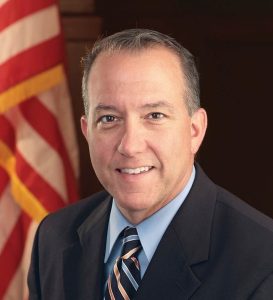 Akron Mayor Dan Horrigan plans to collect signatures in a citywide petition to move Akron’s primary elections from September to May.
Akron Mayor Dan Horrigan plans to collect signatures in a citywide petition to move Akron’s primary elections from September to May.
City Council previously proposed putting the issue on the November ballot, but the legislation stalled. Local primary elections in Ohio are held in May unless a charter provides otherwise.
Summit County is one of only three Ohio counties holding municipal primary elections in September. Moving the Akron primary to May would save the city money while increasing voter turnout.
Five other Summit County cities are also considering the election date change.
Gov. Phil Bryant announced a special election on November 6, to fill a seat in House District 31. The special election will fill the seat vacated by Rep. Sara Thomas last month. Thomas has served in the role for 21 […]
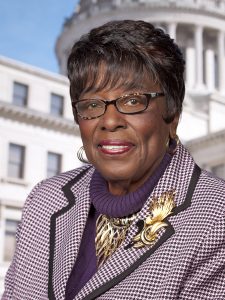 Gov. Phil Bryant announced a special election on November 6, to fill a seat in House District 31.
Gov. Phil Bryant announced a special election on November 6, to fill a seat in House District 31.
The special election will fill the seat vacated by Rep. Sara Thomas last month.
Thomas has served in the role for 21 years and cited the desire to spend more time with family as her reason for resigning.
July 30, 2018 •
Legislation Introduced to Amend Federal Lobbying Law
On July 25, Sen. Michael Bennet and Rep. John Sarbanes introduced legislation aimed to make several changes to the Lobbying Disclosure Act of 1995 (LDA). Currently, part of the LDA’s requirements for determining whether an individual is required to register […]
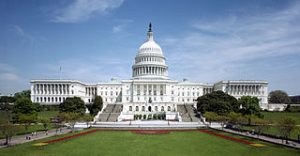 On July 25, Sen. Michael Bennet and Rep. John Sarbanes introduced legislation aimed to make several changes to the Lobbying Disclosure Act of 1995 (LDA).
On July 25, Sen. Michael Bennet and Rep. John Sarbanes introduced legislation aimed to make several changes to the Lobbying Disclosure Act of 1995 (LDA).
Currently, part of the LDA’s requirements for determining whether an individual is required to register as a federal lobbyist include if he or she makes two or more lobbying contacts and if his or her lobbying activities constitute at least 20 percent of the individual’s time in services for a client over any three-month period. The proposed legislation, introduced as two identical bills in both houses of Congress as Senate Bill 3274 and House Bill 6533, would require registration if a lobbyist makes more than one lobbying contact over a two-year period and would eliminate the 20 percent time threshold used in determining whether registration is required.
This bill would also require individuals who provide paid strategic advice in support of a lobbying contact with a government official to register as lobbyists even if they do not directly make the contact, prohibit lobbyists from soliciting, bundling or providing campaign contributions above a total equal to an individual’s campaign contribution limit, and prohibit members of Congress, senators, and candidates for Congress or the Senate from soliciting campaign contributions from lobbyists when their respective bodies are in session.
Additionally, the legislation would no longer permit foreign agents from avoiding registration under the Foreign Agent Registration Act (FARA) by registering under the LDA.
More information is available from the press releases of Sen. Bennet and Rep. Sarbanes, and from a policy summary of the Democracy Reform Task Force, of which Sarbanes is the Chairman.
July 30, 2018 •
Virginia Delegate Greg Habeeb Announces Resignation
Del. Greg Habeeb announced his resignation from the House of Delegates 8th District. Habeeb has served in the House since winning the seat in a special election in January 2011. Habeeb cited the desire to spend more time with family […]
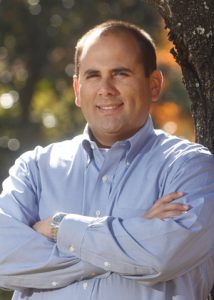 Del. Greg Habeeb announced his resignation from the House of Delegates 8th District. Habeeb has served in the House since winning the seat in a special election in January 2011.
Del. Greg Habeeb announced his resignation from the House of Delegates 8th District. Habeeb has served in the House since winning the seat in a special election in January 2011.
Habeeb cited the desire to spend more time with family and increased responsibilities at his law firm as reasons for stepping down.
Speaker of the House Kirk Cox will review dates and announce a special election to fill the seat in the near future.
Del. Habeeb’s final day as a member of the House of Delegates will be August 31.
July 30, 2018 •
Kansas City Defeats Gift Ordinance
An ethics proposal in Kansas City to limit gifts from lobbyists to $5, restrict taxpayer-funded City Council travel, and extend the revolving door provision was defeated on July 26. The proposal failed 7-4, even after a bill substitute increased the […]
 An ethics proposal in Kansas City to limit gifts from lobbyists to $5, restrict taxpayer-funded City Council travel, and extend the revolving door provision was defeated on July 26.
An ethics proposal in Kansas City to limit gifts from lobbyists to $5, restrict taxpayer-funded City Council travel, and extend the revolving door provision was defeated on July 26.
The proposal failed 7-4, even after a bill substitute increased the gift restriction to $50.
The ordinance was introduced by Councilman Scott Taylor, who is also a Kansas City mayoral candidate.
July 27, 2018 •
Rule Proposed for Federal Vendor Feedback
On July 23, an advance notice of a federal rule change to encourage federal vendor feedback was published in the Federal Register. The General Services Administration, the Department of Defense and The National Aeronautics and Space Administration are considering an […]
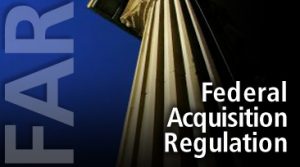 On July 23, an advance notice of a federal rule change to encourage federal vendor feedback was published in the Federal Register.
On July 23, an advance notice of a federal rule change to encourage federal vendor feedback was published in the Federal Register.
The General Services Administration, the Department of Defense and The National Aeronautics and Space Administration are considering an amendment to the Federal Acquisition Regulation (FAR) to establish a standard survey for obtaining voluntary feedback from actual and potential offerors concerning federal government contracts and solicitations.
The Advanced Notice of Proposed Rulemaking (ANPR) for “FAR case 2017-014, Use of Acquisition 360 To Encourage Vendor Feedback” seeks public input on the potential benefits and burdens of voluntary feedback surveys and especially encourages feedback from actual and potential federal contractors.
The ANPR offers some suggestions for public commenters to consider, including whether different information should be collected on the survey based on the type of company or the type of acquisition, what is a reasonable estimate of an organization’s costs to complete the survey, and ideas of what might be the best way the government can obtain honest and open feedback on the contract administration process.
Public comments must be submitted in writing to the Regulatory Secretariat Division on or before September 21, 2018, to be considered during the formulation of the proposed rule.
July 27, 2018 •
NYCU Video Digest – July 27, 2018
State and Federal Intern Greta Conley delivers the fastest 2 minutes in government relations news in this weeks NYCU Video Digest!
State and Federal Intern Greta Conley delivers the fastest 2 minutes in government relations news in this weeks NYCU Video Digest!
July 27, 2018 •
News You Can Use Digest – July 27, 2018
Federal: In Ruling Against Trump, Judge Defines Anticorruption Clauses in Constitution for First Time WRAL – Sharon LaFraniere (New York Times) | Published: 7/25/2018 A federal judge rejected President Trump’s effort to block a lawsuit that alleges he is violating […]

Federal:
In Ruling Against Trump, Judge Defines Anticorruption Clauses in Constitution for First Time
WRAL – Sharon LaFraniere (New York Times) | Published: 7/25/2018
A federal judge rejected President Trump’s effort to block a lawsuit that alleges he is violating the Constitution by continuing to do business with foreign governments. The state of Maryland and the District of Columbia claim Trump is violating the Emoluments Clause of the Constitution, which prohibits elected officials from receiving gifts or benefits from foreign governments without congressional approval. In the first judicial opinion to define how the meaning of the Constitution’s anticorruption clauses should apply to a president, U.S. District Court Judge Peter Messitte said the framers’ language should be broadly construed as an effort to protect against influence-peddling by state and foreign governments.
Mueller Examining Trump’s Tweets in Wide-Ranging Obstruction Inquiry
MSN – Michael Schmidt and Maggie Haberman (New York Times) | Published: 7/26/2018
Special Counsel Robert Mueller is scrutinizing tweets and negative statements from President Trump about Attorney General Jeff Sessions and former FBI Director James Comey, according to people briefed on the matter. Several of the remarks came as Trump was also privately pressuring the men – both key witnesses in the inquiry – about the probe, and Mueller is examining whether the actions add up to attempts to obstruct the investigation by both intimidating witnesses and pressuring senior law enforcement officials to tamp down the inquiry. Mueller’s interest in them is the latest addition to a range of presidential actions he is investigating as a possible obstruction case, like misleading White House statements, public attacks, and possible pardon offers to potential witnesses.
From the States and Municipalities:
Alabama: Rep. Randy Davis Indicted on Bribery Charges
Montgomery Advertiser – Brian Lyman | Published: 7/25/2018
Alabama Rep. Randy Davis was indicted on charges of conspiracy and bribery over what prosecutors describe as an attempt to pressure Blue Cross Blue Shield (BCBS) to cover insulin therapies offered in health clinics in which he had a financial interest. The indictment accuses Davis of working with former Rep. Micky Hammon, an investor in the clinics, to recruit investors, from which he received finders’ fees. Prosecutors also accused Davis of trying to lobby BCBS on behalf of Trina Health, which operated the clinics. Later, the indictment alleges, Davis and Hammon worked together to push a bill through the 2016 legislative session that would have forced coverage of the insulin treatment offered at the clinics.
California: New Head of California Political Watchdog Agency Says It Is Moving on After Period of Tumult
Los Angeles Times – Patrick McGreevy | Published: 7/22/2018
Alice Germond is taking over an agency that has been mired in turmoil for months following a dispute between commissioners over the sharing of power. But the new chairperson of the California Fair Political Practices Commission said she has talked to the other commissioners and believes the panel can put the past behind them to focus on enforcing campaign finance laws ahead of the midterm elections in November. A power struggle in recent months pitted some part-time commissioners against the chairperson at the time, Jodi Remke, who they felt left them out of key decisions on budgets, personnel, legal issues, and policy changes.
Colorado: Colorado Campaign Finance Loophole Allows Dark Money Flyers
Colorado Independent – Sandra Fish | Published: 7/23/2018
Colorado’s campaign finance law has a loophole that allows printed literature, mailers, or other materials about candidates to be distributed without disclosing who paid for them if they do not include so-called magic words such as “vote for” or “vote against.” Colorado was one of only 10 states that did not require disclosure of an ad’s sponsor in the 2016 election cycle. It is a form of “dark money” that prevents voters from tracing who is behind a campaign message.
Florida: South Miami’s Mayor Shut Down an Opponent at Meetings. Now He Faces an Investigation.
Miami Herald – Aaron Leibowitz | Published: 7/18/2018
When Stephen Cody approached the podium at a South Miami commission meeting, Mayor Philip Stoddard had a good idea of what he might say. A few days earlier, a group that Cody created criticized Stoddard for the city’s firing of its former police chief and a resulting lawsuit. Stoddard refused to let Cody speak and demanded he first register as a lobbyist. When Cody returned to the commission the next month, without having registered, Stoddard again cut him off when he began to discuss the police chief’s firing. The county ethics commission ruled there was probable cause Stoddard had violated Cody’s “right to be heard” under the county’s Citizens’ Bill of Rights.
Georgia: Georgia State Rep. Jason Spencer to Resign in Wake of Sacha Baron Cohen Pants-Dropping Debacle
MSN – Meagan Flynn (Washington Post) | Published: 7/24/2018
Georgia Rep. Jason Spencer, who was fooled into repeatedly yelling a racial epithet on comedian Sacha Baron Cohen’s television show, intends to resign effective July 31. “Who Is America?” has pranked a long list of sitting and former lawmakers. In this segment, Cohen played an Israeli antiterrorism expert and Spencer was seen on camera dropping his pants, mocking a stereotypical Asian accent, and seemingly not requiring much coaxing to yell the racial epithet, spurring immediate outrage. Spencer lost in the primary in his bid for a fifth term and initially said he would serve out his final months, but calls for him to resign became too loud.
Illinois: Rauner Blasts Chicago Mayoral Candidate Willie Wilson’s Cash Giveaway, State Says He Didn’t Violate Campaign Rules
Chicago Tribune – John Byrne and Rick Pearson | Published: 7/23/2018
The Illinois State Board of Elections said Chicago mayoral candidate Willie Wilson’s handing out of nearly $200,000 in checks at a recent church event did not break campaign finance laws. A campaign spokesperson said Wilson gave the money to people to help them cover the cost of their property taxes and other expenses as part of his philanthropic work through the Dr. Willie Wilson Foundation, a registered nonprofit. “As far as we can see, it looks like he didn’t use campaign funds for this and there doesn’t appear to have been any quid pro quo, like, ‘Here’s some money, vote for me,'” said elections board spokesperson Matt Dietrich. “So, from our perspective, it doesn’t look like there was anything illegal about this.”
Indiana: Secret Donations to Fuel Hill’s Defense Against Groping Allegations
Indianapolis Star Tribune – Tony Cook, Kaitlin Lange, and Ryan Martin | Published: 7/23/2018
Supporters of Indiana Attorney General Curtis Hill have set up a legal fund to defend him against accusations that he inappropriately touched four women. Attorney Jim Bopp announced the creation of Fairness for Curtis Hill, a nonprofit 501(c)(3) organization formed to collect tax deductible funds for Hill’s defense. Some tax and campaign finance experts questioned whether the new fund could even operate as a charitable nonprofit under the law. Lloyd Hitoshi Mayer, a law professor at Notre Dame, said a 501(c)(3) charity cannot benefit one person. Usually defending public officials from allegations also is not considered charitable, he said. “The name alone should have been a red flag for the IRS,” Mayer said.
Maine: Ethics Commission to Delay Clean Elections Funding Until Court Ruling
Lewiston Sun Journal – Colin Ellis | Published: 7/25/2018
The Maine Commission on Governmental Ethics and Election Practices delayed action on Clean Elections in the hope that a court ruling on the matter might be issued soon but did not rule out the possibility of calling a special meeting should the money continue to be held back. Commissioners agreed it was unfair that certain candidates have not received funding ahead of the November election but said they were not in a position to release funding at this point. Gov. Paul LePage has refused to release $1.4 million in public funding for Clean Election candidates, and Republican House members have refused to fix a typographical error in the law that provides additional funds to be used this year.
Montana: Gov. Bullock Sues IRS Over Decision to Stop Requiring Some Tax-Exempt Groups to Identify Donors
Helena Independent Record – Amy Beth Hanson (Associated Press) | Published: 7/24/2018
Montana Gov. Steve Bullock sued the Internal Revenue Service and U.S. Treasury Department to stop them from removing requirements that politically active nonprofits disclose their donors’ identities. Bullock said the Trump administration failed to give proper notice of or seek public comment on changes to the decades-old rule requiring such disclosure. He is asking a federal judge to find the rollback illegal and set it aside. This is the third time in recent months that Bullock has inserted himself and Montana into national issues and continues his efforts in support of transparent elections.
New York: Who Needs Small Donors When You Have Friends? Ask Gov. Cuomo.
WRAL – Shane Goldmacher (New York Times) | Published: 7/17/2018
New York Gov. Andrew Cuomo has always relied on large donations to accumulate a $31.1 million campaign account. But even as he emerged as one of the Democratic Party’s most prolific fundraisers, he has all but ignored grassroots contributors. Now, mindful of the party’s insurgency, and facing a primary challenge from Cynthia Nixon, the governor has raced to find small donors. But disclosures revealed the extent to which Cuomo remains dependent on big donors, and some of the maneuvers undertaken to obscure that fact. One donor gave 69 times to Cuomo in the final days before the deadline – 67 of them one-dollar donations, driving down his average contribution size.
North Dakota: Anti-Corruption Measure Headed for North Dakota Ballot
West Fargo Pioneer – John Hageman | Published: 7/23/2018
North Dakota voters will decide whether to add anti-corruption language to the state’s constitution this fall. A ballot measure would prevent lobbyists from giving gifts to public officials and would establish an ethics commission that could investigate officials, candidates, and lobbyists. It would also prevent public officials from being a lobbyist while holding office and for two years after leaving their post. State lawmakers would be required to pass legislation mandating “public disclosure of the ultimate and true source of funds” spent to influence elections and government actions.
Ohio: Cincinnati Firm Lobbies for Taxpayers – and Companies That Want Their Money
Cincinnati Enquirer – Dan Horn | Published: 7/23/2018
Anne Sesler once acted as spokesperson for both FC Cincinnati and Hamilton County simultaneously. That is because Government Strategies Group, a firm for which Sesler is a consultant, is paid by both the county and the new Major League Soccer team to handle their lobbying and communications work. The county hired her in 2017 and the team hired her in January. Some say that is a conflict because the interests of FC Cincinnati and Hamilton County are not the same: FC Cincinnati needed $15 million last year for a stadium parking garage and taxpayers picked up the tab. And those are not the only Government Strategies clients with interests that sometimes overlap.
Pennsylvania: Board of Ethics Says Pro-Soda Tax Coalition Violated Lobbying Law
Philadelphia Business Journal – Alison Burdo | Published: 7/20/2018
The leading group that pushed for passage of Philadelphia’s controversial soda tax agreed to pay $8,000 in civil penalties after the Board of Ethics cited it for violations of the city’s lobbying law. Philadelphians for a Fair Future (PFF) formed in 2016 and raised more than $2 million to promote the tax, which was proposed by Mayor Jim Kenney. The board found the group gave incomplete information in required reports on its spending. In addition, four companies and individuals PFF employed to lobby failed to register as required.
State and Federal Communications, Inc. provides research and consulting services for government relations professionals on lobbying laws, procurement lobbying laws, political contribution laws in the United States and Canada. Learn more by visiting stateandfed.com.

